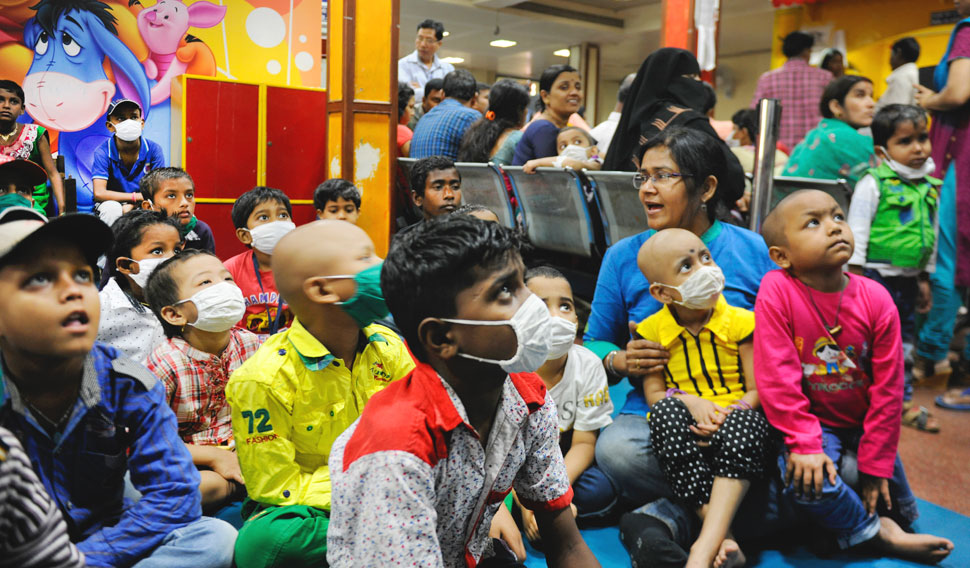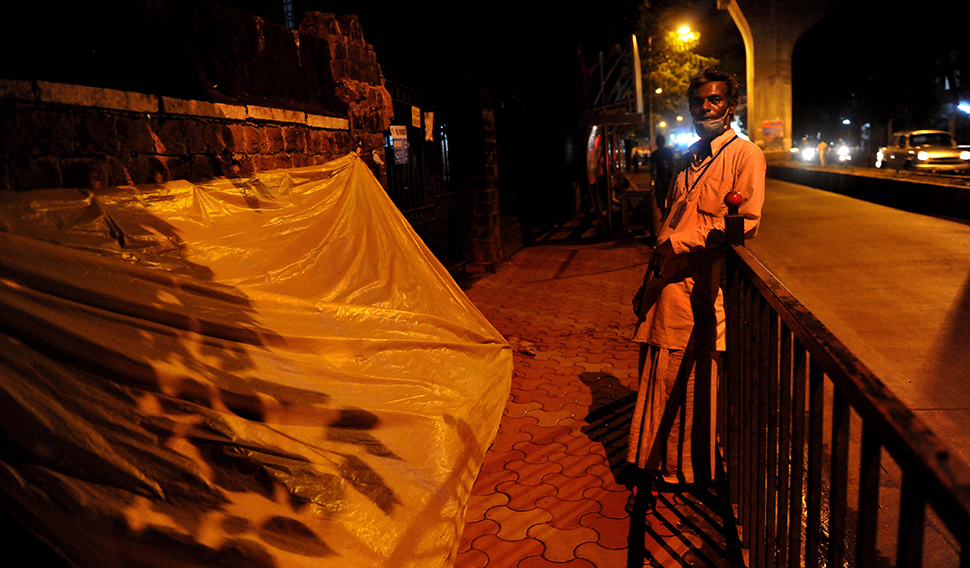
THE INDIAN HERO
Notes of love

Swagata Yadavar
October 25, 2015

With local trains in Mumbai as his stage, Saurabh Nimbkar sings and raises money for cancer victims and families
Commuters aboard the 11:06 Kalyan local from Thane station on Mumbai’s central line are in for a pleasant surprise as the monotonous drone of the moving train is broken by a song. People start taking note of the soulful music being played in the compartment, despite the maddening rush, which is made worse by fights, abuses and the smell of filth and sweat. A bespectacled, lanky young man with a guitar belts out delightful numbers oblivious to the stares from commuters. In no time, people start nodding their heads, some taking photos on their cellphones and some even humming along. The mood lifts, and sombre, bored faces break into smiles. Saurabh Nimbkar, the young man with the guitar, has seen this transformation often enough, prompting him to use the power of music for a cause close to his heart. Four times a week, before catching a train to Ambernath for work, the 23-year-old boards a train to Dadar, performing all the while to raise money for cancer victims and their families.
Saurabh taught himself to play the guitar during his graduation days at a college in Bordi in Thane district. After coming back to Mumbai, he started learning it professionally under Punit Lotia and even joined a band. The turning point in his life came two years ago, while he was doing his master's in bioanalytical sciences. His mother, Jyoti, was diagnosed with acute myeloid leukaemia, a type of blood cancer. Saurabh and his elder brother, Akshay, were by their mother’s side at King Edward Memorial Hospital in Mumbai, for four long months, night and day. Saurabh skipped his classes, and his brother had to quit his job, but they managed with their savings and the help from their uncle.
But he watched how other families suffered. “Most of them came from outside the state. They had to sell their properties to come to the city. While the medical treatment was sponsored by various trusts, there was no one to take care of the relatives of the patients who had nowhere to live and nothing to eat,” he says. He saw family members of patients sleeping on footpaths to save money.
There was a sense of solidarity in the ward. “Cancer is a great leveller, it doesn’t discriminate between the rich and the poor. Only those who go through it know the toll it takes,” says Saurabh. The patients, the doctors and the staff had become like a family. In one touching incident, the father of a patient gave Saurabh expensive and difficult-to-find medicines because he did not need them. It encouraged Saurabh to try and help people in any way he could. One day, he brought his guitar to the hospital. “The atmosphere in the ward is usually very grim, there is stress and tension. But when I played the guitar and sang a few songs, suddenly the ward came alive, it was spontaneous,” says Saurabh. He remembered how he and his friends used to sing during their train trips and how the passengers had liked it. It gave him the idea to raise money by singing in the train.
The ongoing treatment of his mother and his own studies delayed his idea taking off. Tragedy, however, struck soon. His mother, who had completed treatment and was sent home, was told that her cancer had relapsed. It was a major shock for Saurabh and Akshay. Their mother, a primary school teacher, was the pillar of strength for the brothers, after their father went missing six years ago. A hard worker with a positive outlook, she ran the household and ensured that they did well in studies. “She sent me to a hostel because the police kept coming to our house to ask about my dad and she did not want me to be distracted,” says Saurabh. After spending a few months at home, his mother died last September. It was a double blow for Saurabh as his best friend, who was a source of support during his mother’s treatment, had died in a train accident a month before that.
The next six months were difficult for Saurabh and even though he found a job in the quality control department of a pharmaceutical company, there was a void he needed to fill. “It was a difficult year, but I learnt a lot. I realised life has to go on,” he says. So he decided to work on his idea of raising money for relatives of cancer patients and joined hands with Bright Future Association, an NGO.
Four days a week, Saurabh leaves two hours before his shift begins to catch the Dadar-Ambernath local train. Although it can get really difficult in the crowded trains, the overall experience has been positive for Saurabh. A fan of Indian Ocean and independent Indian bands, he mixes indie music with popular Bollywood numbers. “Most people have been very supportive. Some request songs they like. Some others watch me play for the entire duration and donate money while getting down. There was just once that a man objected to the singing, but as soon as he got down, others prodded me to continue,” he says. From Rs.10 to Rs.500, people give whatever they can. “I don’t try to worry about how much money I am raising, I do my job.” Every two to three weeks he hands over Rs.5,000 to Rs.6,000 to the NGO. “I could not bear to visit KEM Hospital or Tata Memorial Hospital after my mother passed away. But I keep in touch with the families we help by calling them and ensuring the money reaches them,” he says.
Akshay seems proud of his younger brother. “I didn’t know that he has been collecting funds in the train. I came to know about it only when he brought the donation box home. He has always been passionate about music, and our mother always encouraged him,” says Akshay.
When asked why he doesn’t play in a band and raise more money to support his cause, Saurabh has his answer ready. “I want to show what a single person can do if he decides to make a difference. Everyone has a skill they can put to good use,” he says. Also, the band may not agree to the idea of donating money. But the word about this singer with a cause has spread and there have been offers of concerts and shows. Steady media coverage also helps. Saurabh, meanwhile, is happy with the local train as his stage.
Q&A with Dr. Jame Abraham

Dr. Abraham is the director of the Breast Oncology Program at the Taussig Cancer Institute, US
What screening options are available for cervical cancer?
Development and widespread use of pap smear is one of the most important success stories in cancer detection and prevention.
For more, click here

